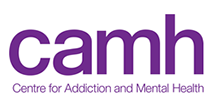Recovery is possible when people seek help

Recovery is possible when people seek help
A few short years ago, some people may have said I “had it all.” I was a partner in an investment firm. A family man who spent weekends at the cottage. An avid cyclist and skier.
But I was also secretly struggling, sick with a depression so severe that it eventually grew into psychosis. The mental pain of this depression was unbearable. This is such a dangerous illness that can be life threatening – and I knew where it could lead. I thought my life was over.
And still I tried to keep my illness hidden and hoped no one would notice. I was terrified that if people found I was getting sick that I would lose my job and my family, and everything that went with them. I got sicker and sicker until it was almost too late.
If this had been a physical illness I would have gotten treatment quicker because I wouldn’t have feared people finding out. With physical ailments we don’t tend to blame ourselves
Charlie Cummings, who has recovered from depression and psychosis
Everything changed when I visited CAMH’s Gerald Sheff and Shanitha Kachan Emergency Department. There, my illness was diagnosed for the first time and I started treatment immediately, as an inpatient for just over two months. Finally, after a full year in remission, I took part in a relapse prevention course at CAMH once a week for eight weeks to help me remember everything I was supposed to do to keep from slipping back into “the big deep.”
I worked so hard to get better. As I recovered, I learned to watch for signs so my illness didn’t return.
Today, I have my life back. I’ve returned to work and have fallen in love again with being active. I cycle and ski again, and have joined a tennis club with my wife. The experience has taught me so much – about myself, about stigma and about recovery.
We often don’t know how supportive our friends are going to be; it’s one of the ironies of the disease. My work was amazing, encouraging me to take as long as I needed. “This is way more important than anything else,” they told me.
When it comes to stigma, I was a victim of my own thoughts. It was my own stigmatization of the disease that held me back. I was the one who was worried about it.
I hope that people will see that anyone – someone like me, a “normal” 52-year-old man with a great life and a family – can get sick and also recover. I hope people will realize that if they’re not feeling well they need to do something about it much earlier than I did, before it gets dangerous.
I want people to know that recovery is possible, and that there is hope and help. I truly feel that I got so sick because I didn’t know people could just get sick, or that mental illness was treatable. If I’d been educated about it earlier, I would have sought help sooner.
NT5






















